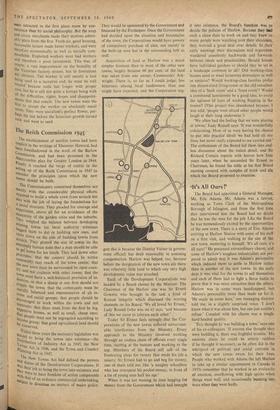T he Reith Commission 1945 The establishment of satellite towns had
been implicit in the writings of Ebenezer Howard, had been foreshadowed in the work of the Barlow CoMmission and had been promised in the Abercrombie plan for Greater London in 1944. setting up Finally it reached the verge of reality in the consider the the Reith Commission in 1945 to principles ilinbcuipltes upon which the new towns should be The Commissioners concerned themselves not Merely with the considerable physical efforts required to build a whole town from scratch but also with the job of laying the foundations for a social structure. They pleaded for courage and experiment, above all for an avoidance of the monotony of the garden cities and the suburbs. They weighed the balance between deVeloping existing towns (as local authority witnesses "egged them to do) or building new ones, and came down on the side of building towns from scratch. They plotted the size of towns on the extremto ely human scale that a man should be able
get
home for his lunch. They laid down other Principles; that the country should be within treasonably easy reach of the town centre; that he new town must be surrounded by open coun- try and not coalesce with other towns; that the town
te
n must a well-balanced provision of in- dustries, that a slump at one firm should not Cripple the town; that the community must be Socially balanced and representative of all in- "orne and social groups; that people should be encouraged to work within the town and not commute; that there must from the first be big, expensive houses, as well as small, cheap ones; that People must not be segregated according to k come group; that good agricultural land should conserved. __Within three years the necessary legislation was a-s. sed to bring the towns into existence—the eili),Istribution of Industry Act in 1945, the New poi Towns Act in 1946, and the Town and Country Planning Act in 1947. __The New Towns Act had defined the powers 4nd duties of the Development Corporations. It Was their job to bring the town into existence and than Were to have freedom of action comparable 7i.th. that of an ordinary commercial undertaking, 5t1bJeet to direction on matters of major policy. They would be sponsored by the Government and financed by the Exchequer. Once the Government had decided upon the situation and boundaries of the town, the Corporations would have powers of compulsory purchase of sites, not merely in the built-up area but in the surrounding, belt as well.
Acquisition of land at Harlow was a much simpler business than in most of the other new towns, largely because 60 per cent. of the land was taken from one owner, Commander Ark- wright. There is, so far as I could judge, less bitterness among local landowners than one might have expected, and the Corporation sug- gest this is because the District Valuer (a govern- ment official) has dealt reasonably in assessing compensation. Harlow was helped, too, because before the designation of the new town site there was relatively little land to which any very high development value was attached.
Each of the Development Corporations was headed by a Board chosen by the Minister. The Chairman of the Harlow one was Sir Ernesk Gowers, who brought to the task a kind of Roman integrity which disarmed the warring elements on his Board. `We all loved Sir Ernest,' Lady Russell (who was on it) says, 'and because of this we came to tolerate each other.'
Today Sir Ernest feels strongly, that the Cor- porations of the new towns suffered unwarrant- able interference from the Ministry. Every approach to the Ministry involved working through an endless chain of officials every single time, starting at the bottom and working to the top. Members of his Board still talk of the frustrating pleas for money that made his job a misery; Sir Ernest had to go and beg for money, one of them told me, like 'a naughty schoolboy who has overspent his pocket-money, in front of a lot of young men half his age.'
When it was not wasting its time begging for money from the Government which had brought it into existence, the Board's function was to decide the policies of Harlow. Because they had such a clean slate to work on and they knew so many people were watching over their shoulders, they worried a great deal over details. In their early meetings their discussions and arguments wandered ceaselessly backwards and forwards between ideals and practicalities. Should houses have individual gardens or should they be set in a landscape common to all? Did working-class houses need or want lavatories downstairs as well as upstairs? Would working-class families prefer one decent-sized living-room or the old suburban idea of a 'back room' and a 'front room"? Would a communal launderette be a good idea, to avoid the ugliness of lines of washing flapping in the breeze? (This project was abandoned because, I was told, 'people were afraid other people would laugh at their long underwear.') 'We often had the feeling that we' were playing at towns,' Lady Russell says. 'It was wonderfully exhilarating. Most of us were having the chance to put into practice ideals we had held all our lives, but never really expected to see carried out.' The enthusiasm of the Board led them into end- less discussion about the tiniest detail, and Sir Richard Costain reports with horror how four years later, when he succeeded Sir Ernest as Chairman, he found the table at his first Board meeting covered with samples of brick and tile, which the Board proposed to examine.










































 Previous page
Previous page